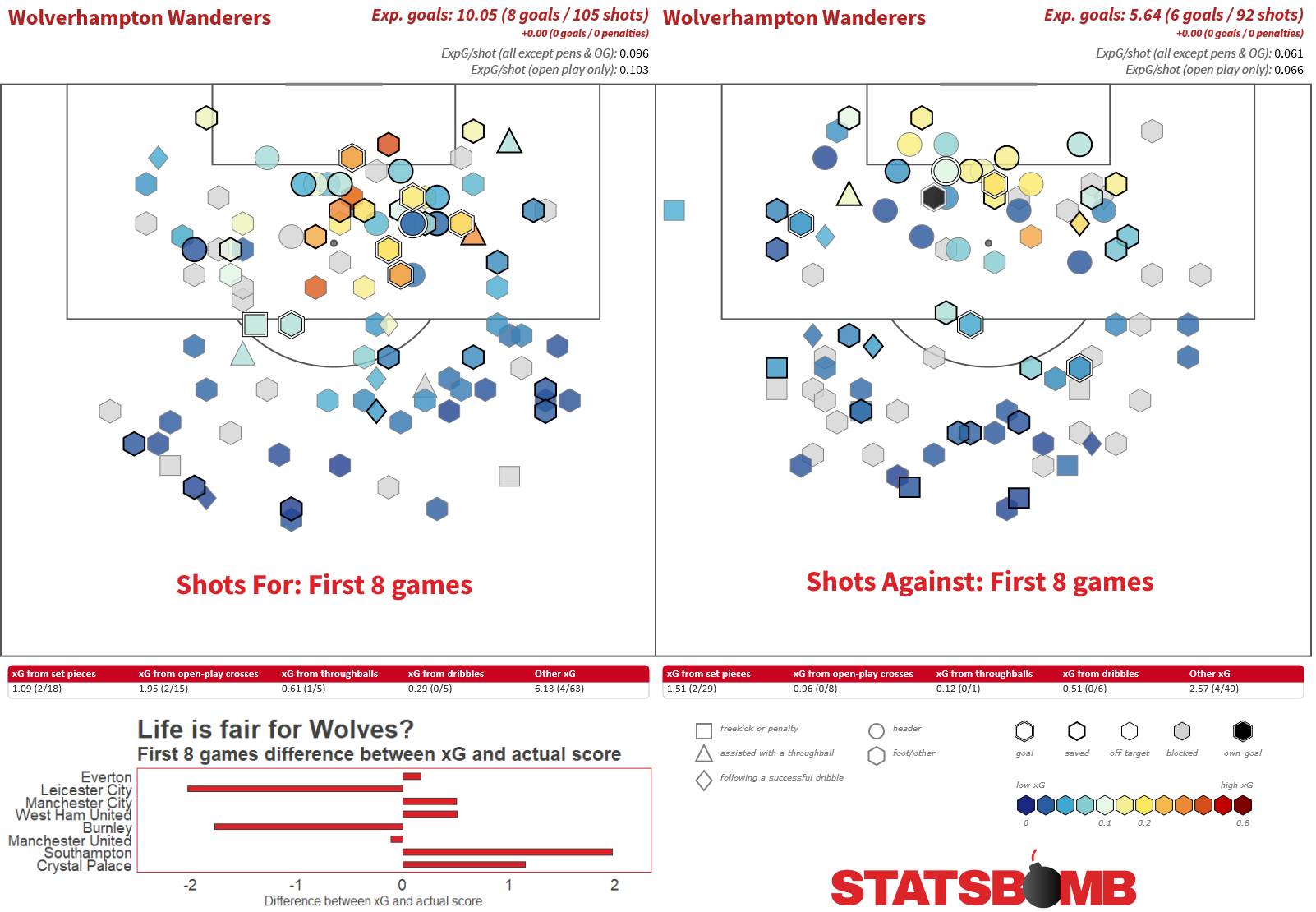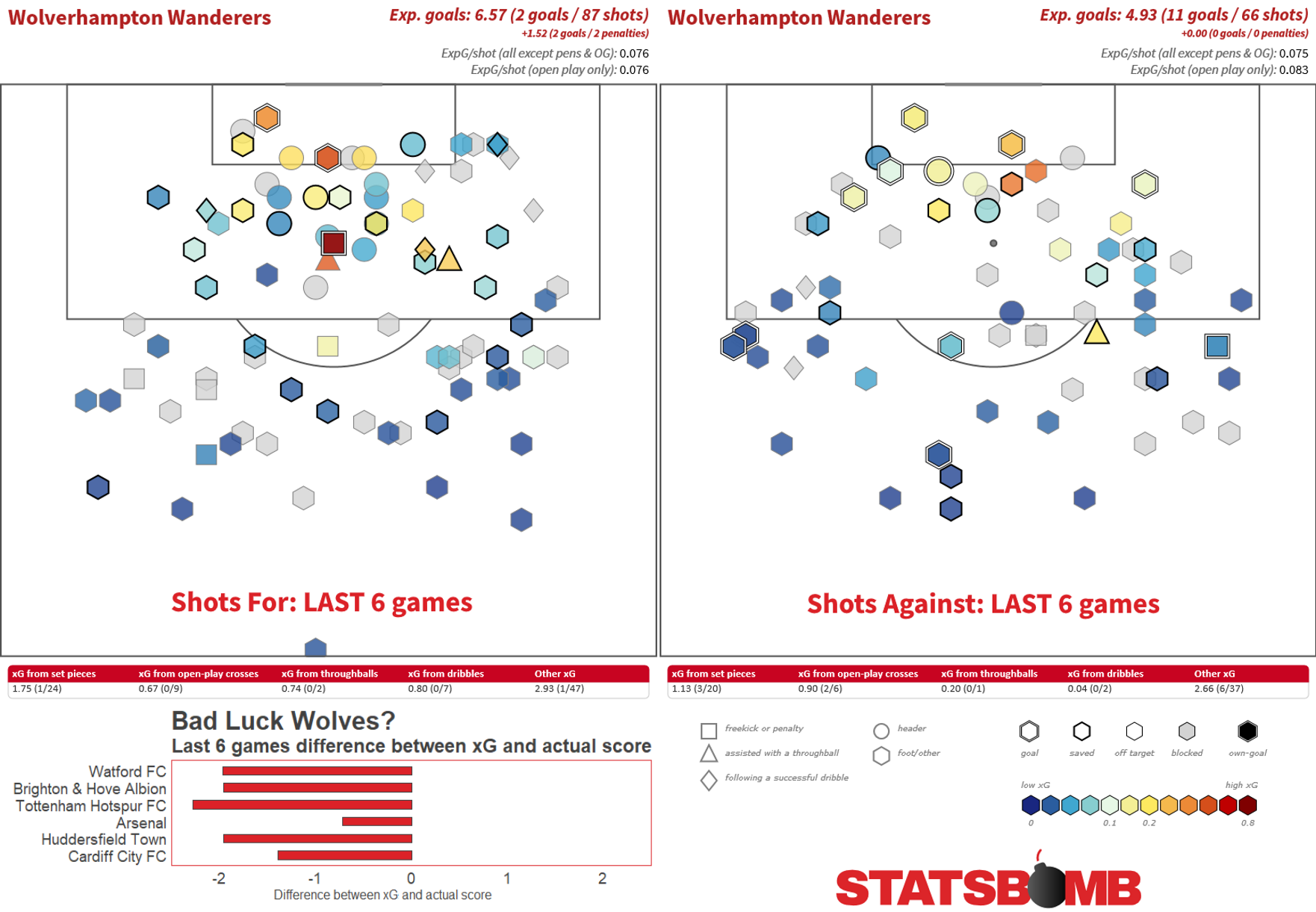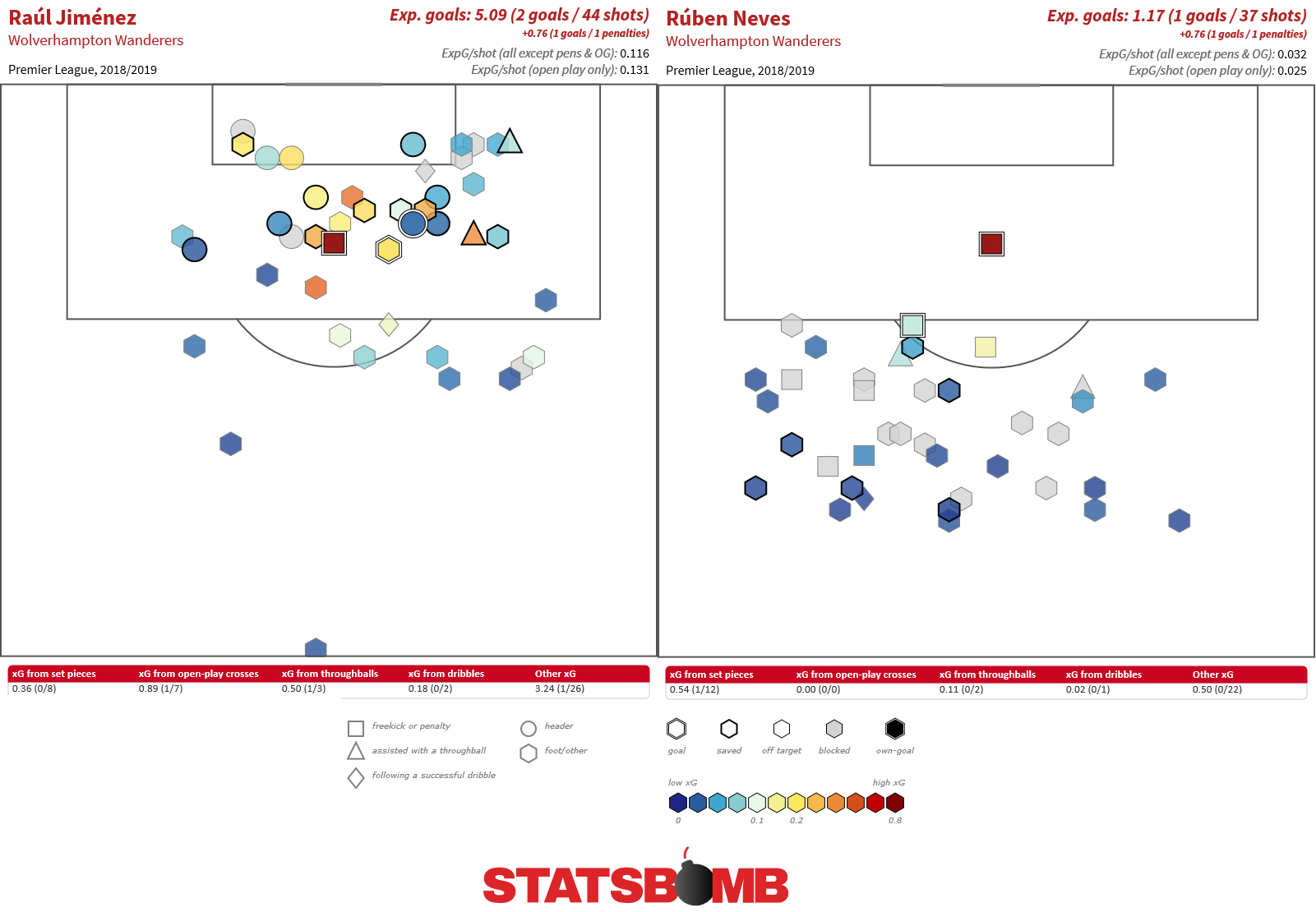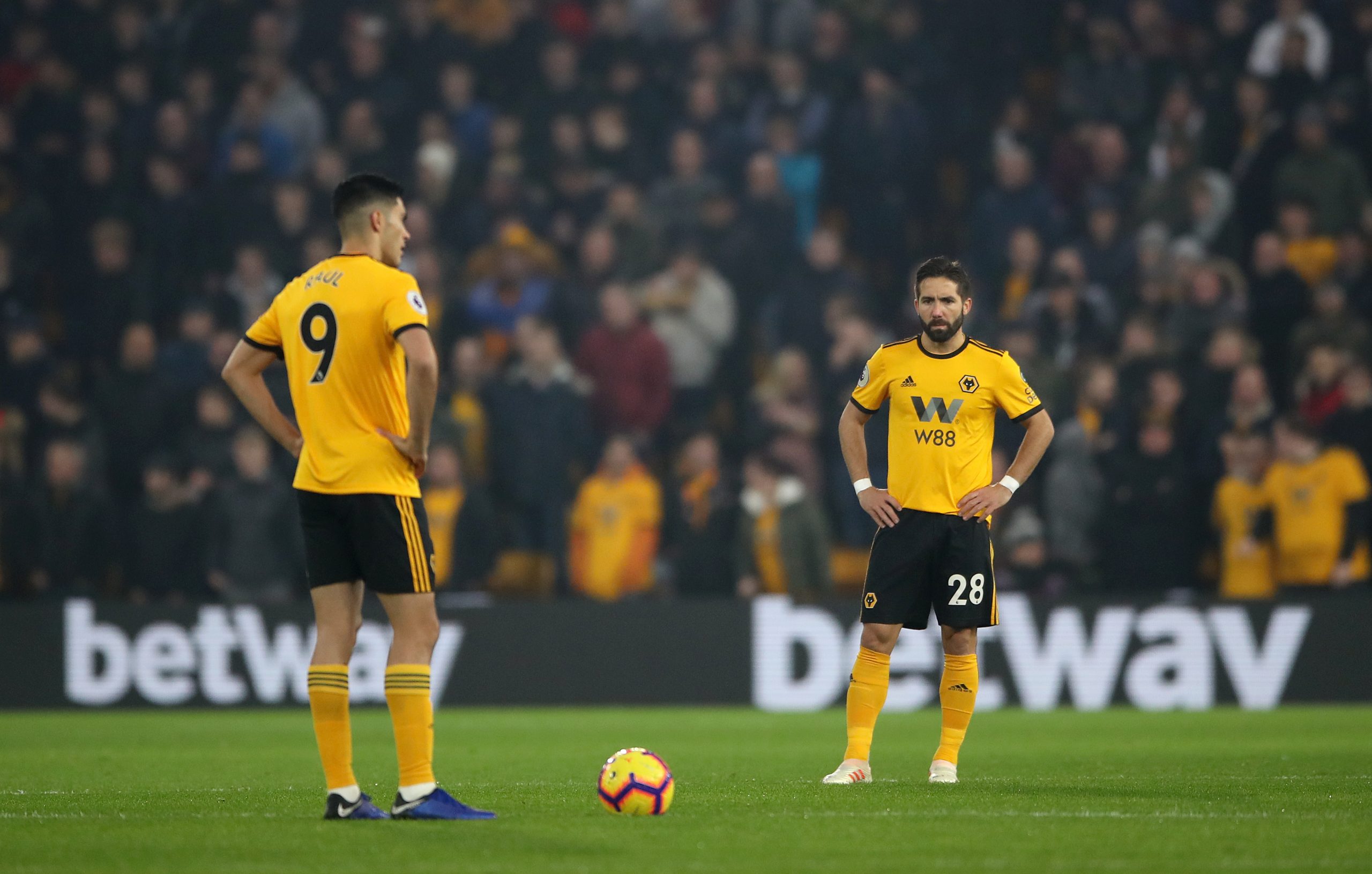Wolves’ time in the Premier League was hotly tipped to be a roaring success. In recent weeks, the results have waned and they now find themselves down in twelfth place: perfectly respectable for a newly promoted team, but perhaps slightly underwhelming given the pre-season hype. So how good are Wolves?
Promotion and a fine start
Powered by significant investment, the team readily won the Championship in 2017-18 having retained their position at the top of the league from the end of October through til May. The summer saw more investment, or at least a bunch of the previous season’s loans got made permanent, and a sprinkling of class was added on top. The aging but richly decorated João Moutinho arrived to form a “Portugal, Then And Now” central midfield alongside last year’s club Player of the Season Rúben Neves while Rui Patrício gave the team what every newly promoted side could do with, a competent goalkeeper. Football stats fans also got the coin in the Christmas pudding when late on Adama Traoré confirmed a move from Middlesbrough, to continue his love affair with ball carrying and the touchline at the highest level.
And for two months, it went really well.
Draws with Everton, Manchester United and most notably Manchester City were all more than ample reward for a team new to the division, and a 30 shot 1-0 beatdown of last season’s seventh placers, Burnley showed the world that Wolves could compete well at this level. On the 6th October, Wolves sat seventh with a 4-3-1 record and a plus-two goal difference, a shade behind their plus-four and a half goal expected rate:

The inset bar chart shows the single game differences between expected goals and the actual score. As is evident, throughout the first eight games, there was a fairly usual split between expected goals skewing in favour or against Wolves.
Six games of misery
The last six games have been close to a disaster for Wolves: in a mixed schedule they have lost five and drawn one. There is no shame in being edged out by the odd goal in five against Tottenham and a draw against Arsenal was good, perhaps even disappointing given Henrikh Mkhitaryan’s late equaliser. Otherwise, home defeats to Watford and Huddersfield don’t read too well on the surface and neither do away defeats at Brighton and Cardiff. Yes, Wolves are a newly promoted team, but also these are all teams that they need to perform well against and pick up points. To hit a bad run at exactly this moment is far from ideal, especially given that they host Chelsea and Liverpool as well as the return games against Man City and Tottenham, all within the next six weeks. Points may be hard to find this at times through early winter.
However, the last six games have had an almost comical negative skew for Wolves. Expected goals still likes them--a lot-- and has them (including their two penalties against Tottenham) at about eight goals to five across this period, so a healthy +0.5 xG per game. Reality has taken a far darker turn, with four scored and 11 allowed. Ignore the penalties and you’ve got the overall attack at four and a half goals behind expectation and the defence behind by six goals. And consistent too! Check out the skews in the bar chart subset. Wolves just can’t buy a break right now:

If you evaluate the goals Wolves have conceded recently, quite a few have emerged from the realm of the improbable. Mkhitaryan’s goal was a cross that went the whole way, Etienne Capoue drilled one from thirty yards and Junior Hoilett’s winner last Friday night was the type of hit that might go in once in fifty attempts, possibly less than that if the pace of it could truly be accounted for. That estimate isn’t trivial, they all spec out as between 1.5 and 2.5% chances.
Attack
So we’ve established that Wolves have been on the mother of all cold streaks recently, but the simple interpretation is that their profile isn’t that of a team that will struggle long term. There are two aspects in play though: in attack Wolves look no more than okay but have finishing woes, while in defence they look very solid.
Being behind expected rates in attack can happen to any team in short bursts, but with the league now up to 14 games, there is the consideration of whether or not Wolves’ attackers are contributing enough overall or if this is an area of the team that may benefit from yet more investment. Raúl Jiménez has two goals (and a penalty) from an expectation of five. He was bought to fit into the team ahead of Léo Bonatini who hasn’t scored a league goal since December and having not started a league game this season looks well out of favour. It’s also surprising that none of the support cast has pitched in with goals, in particular, Diogo Jota, after his 17 league goals last season, but also Hélder Costa. Between the two of them, 1800 minutes for zero goals and zero assists is distinctly underwhelming while Traoré and Ivan Cavaleiro have made small contributions in fleeting minutes. Indeed, behind Jiménez nobody in the team who has played any significant time has any kind of notable goal expectation. Neves is the only regular starter other than Jiménez to average more than two shots per game, and the single shot he’s taken in the penalty area was a penalty. Indeed, feeding into a lack of creativity high up the pitch, 46% of shots they take from outside the box, enough to rank fifth most in the league. For chance creation, Jiménez leads the way for regular starters at around 0.22 expected goals assisted per game that feed into four assists. Jota is at 0.16, but the only other contributors here are the bench men. Overall, there's distinct room for improvement in the final third.

Defence
It’s possible the push-pull effect of running an effective defence has hampered Wolves’ attack. We’ve seen similar recently with Liverpool, who while fixing defensive issues have slowed down a smidgen up front. Unless you’re Man City, getting the best of both worlds appears to be extremely difficult to attain. Yet in adapting to the Premier League, Wolves’ defence appears to be very good. They have persisted with the three centre back formation they used in the Championship and Ryan Bennett, Conor Coady and Willy Boly have missed one start between them. They are the only team in the Premier League this season to have started consistently with three centre backs, Huddersfield have used it in the majority of their games but not all and a bunch of teams have tried it more occasionally. Perhaps the effect of Antonio Conte's Chelsea title winners is starting to wear off? After all fashions are fickle in football but Wolves and Nuno Espírito Santo are admirably committed to their method. Consistency in selection has extended to Moutinho and Neves, both ever present shielding in front of the defence. The core and strategy has been stable.
Wolves’ defensive focus can be initially identified by the opposition pass success rate, which at over 80% is third highest in the league. Easy to pass against? Not quite, move into their final third and Wolves rank tenth. They are happy to allow sterile possession but will put the squeeze on when you enter their defensive areas. Closer in it gets even better, they rank sixth for passes allowed in the box. The shots they allow are generally of low value. Their expected goals per shot against rate leads the league (around 0.07 per shot, reliable throughout the season), and is powered at least in part by the league's longest average distance for non-penalty shots. This kicks into other defensive indicators which all imply organisation and structure. When facing shots they have the most defenders between the shooter and the goal, and they also lead the league for the most defenders within the “cone” between the shooter and the goal. All told, Wolves’ expected goals against at 0.82 per game is better than everyone but Liverpool and Man City. Stern stuff.
There have been some noises around the form of Rui Patrício recently. He left his line for Aron Gunnarsson's goal against Cardiff and was perhaps easily beaten by Aaron Mooy's free kick last week, but at least in terms of general shot stopping across the season, he rates as bang on expectation via StatsBomb's model for shot outcomes.
What next?
As mentioned, Wolves’ short term future is not without tough games, and December may well stretch their resources. No team in the Premier League has used as few players--just 17 so far--and the squad looks as though it lacks depth. The first team is stable and capable, but should injuries bite at some point, the depth of the squad will be tested. They have already lost left back Jonny ahead of this busy period and 19 year old Rúben Vinagre has stepped in, while in midfield Leander Dendoncker has been unsighted in the league since a summer loan move and the promising 18 year old Morgan Gibbs-White has been empowered to play. Ahead of the January window, Wolves have a choice whether to bulk out their squad and continue building or run with a thin squad and wait for the summer. At least one attacking, creative option would appear a prudent play.
Regardless, this Wolves team is well capable of landing comfortably in mid-table, and with the right breaks and some life instilled into the attack, potentially more. Their current run of form looks like nothing more than a freakish blip and their defensive level should carry them a fairly long way. A combination of what is a well drilled and now fairly unique system for the league and decent talent levels should ensure that Wolves turn the corner soon enough. Ultimately, teams that beat Wolves during this part of the season may look back and be very thankful for their points.
Header picture courtesy of the Press Association
